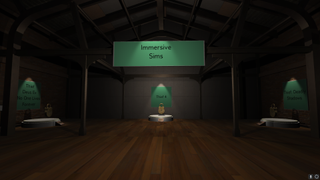The Museum of Mechanics: Lockpicking demonstrates why some minigames just click
Because keys are for noobs.

The Museum of Mechanics: Lockpicking is a playable exhibition of a common gaming interaction and, well, it's an experience like visiting the Derwent Pencil Museum. Before you go in you're thinking pencils are the most boring thing on Earth, let's get this over with, then you come out toting a gift shop bag ready to fight anyone who dares besmirch one of humanity's greatest tools.
Ahem. This self-described "buffet" of lockpicking mechanics is the brainchild of Dim Bulb Games, founded by Johnnemann Nordhagen (best-known for Where the Water Tastes Like Wine), and has a museum layout dividing games' lockpicking mechanics into the loose categories of role-playing, immersive sim, and others. These groupings pull-together lockpicking implementations that influence or iterate upon one another, and each exhibit consists of a section label giving a brief overview of the mechanic's history, operation, and some analysis, then a functional recreation of that lockpicking minigame. Originally released in August, the museum's subsequently been updated with a bunch of new minigames.
Updated the Museum again with the minigame from Alpha Protocol (which shares mechanics with Sleeping Dogs, so this is both!) Getting near the end of my list of lockpicking minigames - ideally no one will implement any more, ever again https://t.co/cIM1txdeOk pic.twitter.com/xGqa2sbw2bDecember 21, 2020
So for example, the role playing area begins with tabletop Dungeons & Dragons, then shows how this dice-rolling mechanic was implemented by the early Fallouts. It then goes into Westwood's (tough!) Hillsfar lockpicking minigame, a timed pictorial challenge that's arguably the first of its kind, through Anachronox's unique number-guessing spin, onto Oblivion, and ending up in Bethesda's subsequent titles. Playing through and reading this section did give me a renewed appreciation for Bethesda's lockpicking, which I was heartily sick of by the time Fallout 4 came around, because in this context you can see it's among the best solutions developers have come up with.
This is part of the museum's appeal: on the labels you read the developers themselves trying to reason out why certain implementations do or don't seem to overlay onto the activity being simulated, why some create a certain atmosphere, why some work and others don't. It's compelling enough that it inspiredd this similar project, a Museum of Mass Effect Minigames.
The final reason this charmed me is a hilarious drive-by on the Splinter Cell series, following a well-argued analysis of why its lockpicking minigame is terrible. "But, since the challenge in the series lies more with the combat, stealth portions, and choking down the regressive political stances, the lockpicking fills a different niche of fulfilling the overall fantasy of a spy upholding American hegemony."
To be clear, this isn't a game. It's not even intended for players, so much as "game developers looking to explore the range of lockpicking mechanics that have been implemented in the past" (itch.io description). But if you enjoy seeing the evolution of something apparently simple laid out, thinking about why it is the way it is, and just fiddling with different minigames trying to 'recreate' the same thing, this is a bitesized, interesting and well-curated experience.
The biggest gaming news, reviews and hardware deals
Keep up to date with the most important stories and the best deals, as picked by the PC Gamer team.
Rich is a games journalist with 15 years' experience, beginning his career on Edge magazine before working for a wide range of outlets, including Ars Technica, Eurogamer, GamesRadar+, Gamespot, the Guardian, IGN, the New Statesman, Polygon, and Vice. He was the editor of Kotaku UK, the UK arm of Kotaku, for three years before joining PC Gamer. He is the author of a Brief History of Video Games, a full history of the medium, which the Midwest Book Review described as "[a] must-read for serious minded game historians and curious video game connoisseurs alike."
Most Popular







